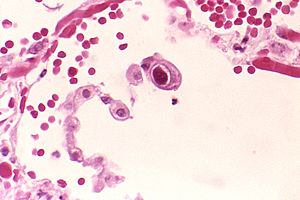Cytomegalovirus facts for kids
Quick facts for kids Cytomegalovirus |
|
|---|---|
 |
|
| CMV infection of a lung pneumocyte. | |
| Virus classification | |
| Group: |
Group I (dsDNA)
|
| Family: |
Herpesviridae
|
| Subfamily: |
Betaherpesvirinae
|
| Genus: |
Cytomegalovirus
|
| Species | |
|
see text |
|
Cytomegalovirus (say: sy-toh-MEG-uh-loh-vy-rus), or CMV for short, is a very common type of Virus that can infect people. Its name comes from Greek words meaning "large cell," because it can make infected cells grow bigger. It's a kind of Herpesvirus, often called HCMV (Human Cytomegalovirus) or Human Herpesvirus 5 (HHV-5).
Just like other herpesviruses, once you get CMV, it stays in your body for a long time, even for your whole life. Most of the time, it doesn't cause any problems or symptoms.
Contents
What is Cytomegalovirus?
CMV is a virus that can spread from person to person. It's very common around the world. Many people get it when they are young and don't even know it.
How it Spreads
CMV can spread through body fluids like saliva, urine, blood, and breast milk. It can also spread through close contact with someone who has the virus. For example, sharing drinks or toys with a child who has CMV could spread it.
Who Gets It?
CMV is very common. About two out of every five people in the world have HCMV. In some countries, like the United States and the United Kingdom, more than half of all people have had the virus. This means it's a very widespread infection.
CMV and Your Health
For most healthy people, CMV doesn't cause serious problems. If you get it, you might not feel sick at all. Sometimes, it can cause mild symptoms like a fever, sore throat, tiredness, or swollen glands. These symptoms are often like a common cold or flu.
When CMV Can Be Serious
While usually harmless, CMV can be more serious for certain people. This includes babies who get it before they are born, or people with weakened immune systems. For example, people who have had organ transplants or are undergoing certain medical treatments might have more severe symptoms.
Treatment and Prevention
Currently, there is no cure for CMV. However, scientists are working hard to develop vaccines. These vaccines would help prevent people from getting the virus or reduce how serious the infection is.
Staying Healthy
Since there's no cure, preventing the spread of CMV is important. Good hygiene, like washing your hands often with soap and water, can help. Especially after changing diapers or touching a child's saliva, hand washing is a good idea.
Images for kids
See also
 In Spanish: Citomegalovirus para niños
In Spanish: Citomegalovirus para niños
 | Delilah Pierce |
 | Gordon Parks |
 | Augusta Savage |
 | Charles Ethan Porter |

